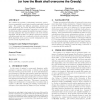Free Online Productivity Tools
i2Speak
i2Symbol
i2OCR
iTex2Img
iWeb2Print
iWeb2Shot
i2Type
iPdf2Split
iPdf2Merge
i2Bopomofo
i2Arabic
i2Style
i2Image
i2PDF
iLatex2Rtf
Sci2ools
111
click to vote
IWCMC
2009
ACM
2009
ACM
Scheduling cooperative emergency response: or how the meek shall overcome the greedy
We consider the problem of scheduling emergency responders to geospatially located finite duration temporally bounded tasks. We consider two different schedulers, Greedy and Meek. schedulers: the Greedy algorithm schedules the closest available qualified emergency responder to a task, while the Meek algorithm, assigns the qualified emergency responder that minimizes the expected future cost of the Greedy algorithm. We show that to be effective emergency response scheduling must take into consideration future costs (as the Meek algorithm does), and not merely instantaneous costs (as the Greedy algorithm does). Categories and Subject Descriptors C.2.1 [Computer-Communication Networks]: Network Architecture and Design–wireless communication General Terms Algorithms, Performance Keywords Ad hoc networks, cooperative mobility
| Added | 23 Jul 2010 |
| Updated | 23 Jul 2010 |
| Type | Conference |
| Year | 2009 |
| Where | IWCMC |
| Authors | Carol Dottin, Bilal Khan |
Comments (0)

